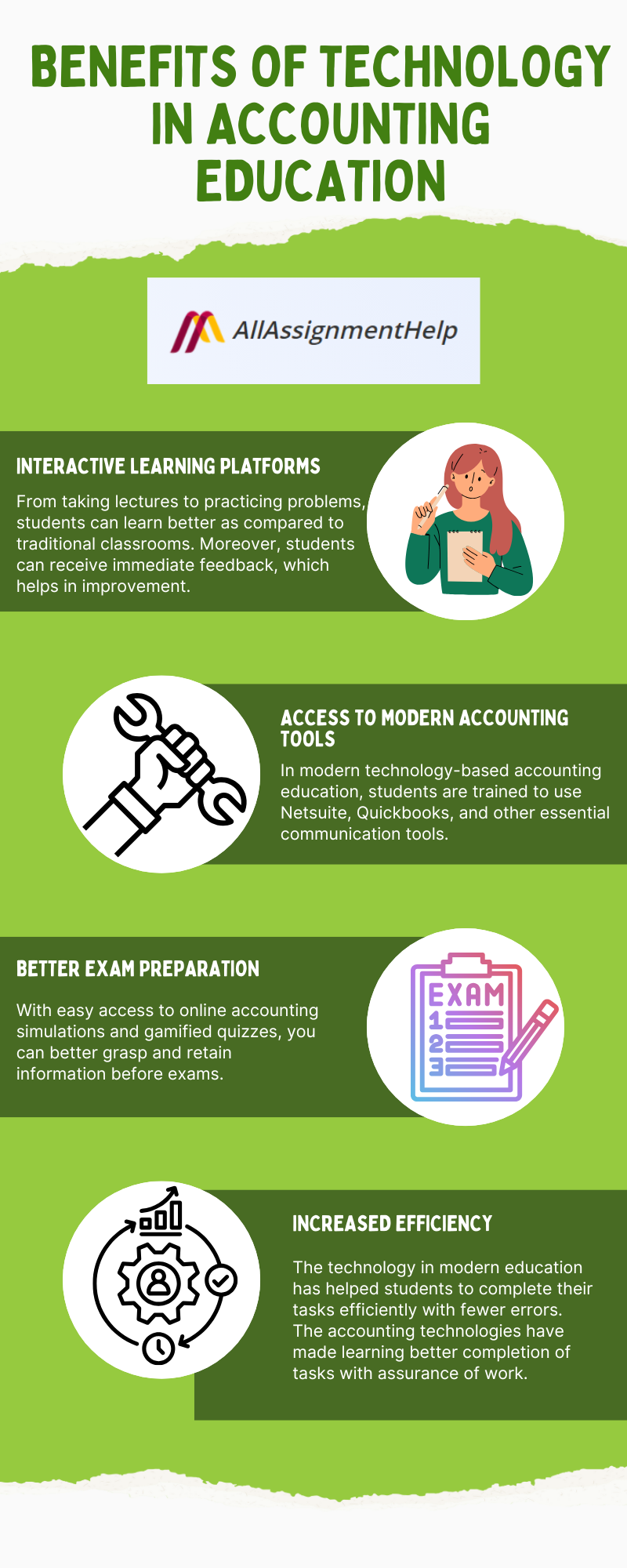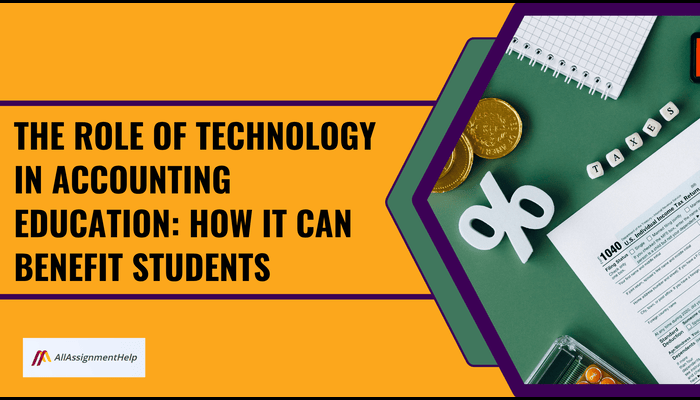Table of Contents
In all these years, technology has emerged as a powerful tool, bringing innovation to every industry. The introduction of technology in nursing has improved the quality of care and reduced medical errors. In the engineering industry, it has led to the development of the smartest infrastructure. When discussing the accounting industry, technology has benefited it in every way. It has transformed manual bookkeeping into real-time. The technology in accounting education has introduced innovative learning techniques. Static textbooks and manual calculations have evolved into dynamic ones. Moreover, it has bridged the gap between theoretical knowledge and professional application.
One may find many facts about technology in accounting education and how it has filled the education gaps and benefited both teachers and students. This blog post from All Assignment Help also aims to discuss the impact of technology in accounting education and the role of technology in modern accounting education.
How Technology in Accounting Education Benefits Students
Accounting is a field of study where students will learn to maintain books of accounts and other financial needs of businesses to help them do well in the long run. In the olden days, students used to learn all accounting concepts and were trained to prepare everything manually. Whether it is balance sheets, trial balances, or cash flow statements, they do everything on their notes using pens. This manual preparation has also provided many obstacles where students need help understanding their accounting concepts. However, with technology in accounting education, students will have
- Better learning experience with interactive learning platforms.
- Accessibility and flexibility to learn self-paced modules.
- The opportunity to gain relevant accounting skills like data visualization, data analysis, and automation.
- Being updated on all the changes and new updates in the accounting field.
Here is how accounting students benefit from these technological advancements.
Also Read: The Role of Certifications in Online Accounting Education

Interactive Learning Platforms
Technology has helped in increasing students’ engagement and understanding. The learning management system is the most widely used technology in accounting education. From taking lectures to practicing problems, students can learn better as compared to traditional classrooms. Moreover, students can receive immediate feedback, which helps in improvement.
Undoubtedly, LMS has helped students understand complex accounting concepts. Moreover, students struggling to take their online class can seek online class help. You can pay someone to do your online class and ensure A grades in your class. Professional experts can reduce your stress and help you improve your academic performance.
Mastering SQL for Better Audit Assurance
The use of new technologies, such as structured query language (SQL), has made it possible for students to gain database communication skills. With the help of this technology in accounting education, accountants can provide a higher level of assurance in their audit findings, which was not possible with traditional transaction sampling.
Use Python to Automate and Reduce Errors
The use of programming languages like Python can help in correctly meeting the parameters of clients. For example, if you manually check documents, you are likely to make more mistakes and take more time. However, modern technology can remove hours of administrative work for auditors and help them perform better.
Access to Modern Accounting Tools
In modern technology-based accounting education, students are trained to use Netsuite, Quickbooks, and other essential communication tools. With these important tools, you boost efficiency, improve accuracy, save time, and also fulfill all of your challenging accounting work.
Better Exam Preparation
The inclusion of technology in modern accounting education helps students to better prepare for their exams. You no longer have to worry, can I pay someone to take my online exam? With easy access to online accounting simulations and gamified quizzes, you can better grasp and retain information before exams.
The weak students can utilize interactive accounting tools to better practice accounting concepts. You can get hands-on practice with ledgers, balance sheets, and journal entries.
Increased Efficiency
Traditional accounting processes used to be manual. Students were required to do calculations manually; because of this, there was less efficiency and more errors. However, the technology in modern education has helped students to complete their tasks efficiently with fewer errors. The accounting technologies have made learning better completion of tasks with assurance of work.
Learning with Technology
Auditing, corporate finance, and taxation are some of the core areas of accounting. These areas are important, but are complex. In a traditional learning environment, students struggle to comprehend and understand these subjects. But in the future, we can expect that technology will be used in accounting learning. These will help students better understand digital facelifts. Integrating tools will speed up the learning and revision process.
Make Accurate Predictions
- Big data is a major part of accounting education trends. This future trend in accounting will help students detect fraud and make more accurate predictions.
- The data analytics tools will help accountants provide the right advice to clients, assess risk, prevent financial losses, predict future trends, perform monitoring, and develop effective solutions. All of these would not have been possible with the old accounting system. So we can proudly say that the technology in accounting education has allowed accountants to showcase their resilience and their indispensable role in business.
It is essential for students to update themselves and learn to use modern technology in education. Right from your university time, try to upgrade your skills. Accounting is not just limited to earning a degree. There are many more things you could learn to become a top professional. Moreover, do not compromise on your academic work. Make sure you ensure the timely submission of assignments and other tasks. To make the process easier, you may also hire an assignment helper. Always try to maintain a proper balance. Learn about new accounting software and industry trends to fulfill your duties as an accounting professional. Also, never compromise on your accounting degree; ensure top grades in it.
Also Read: Fundamentals of Accounting: What You Need to Know
Technology in Accounting Education—What You Should Know
Technology has transformed every industry, and the accounting industry is no exception. It has helped in enhancing engagement and understanding with access to a global language. In simple words, with the inclusion of technology, students can learn better with long-term career growth. However, in addition to this, you need to become proficient in using technology in accounting education. Get familiar with the technology to move forward in your career without any difficulty.
As an accounting student, some of the technologies you should know are. These technologies will enhance productivity by simplifying complex accounting tasks.
- Cloud-based accounting software: Most of the organizations demand that their employees manage financial data using cloud-based software. Learn how to collaborate and automatically update financial records. Learning to use this software will help you work in remote or hybrid accounting roles and build real-world skills.
- Data analytics and visualization tools: Now, accounting is way more than just crunching numbers. It helps in analyzing financial trends and providing strategic insights. To have a bright career, learn data analytics and visualize complex financial data for better communication. A knowledge of visualization tools in your resume will add a competitive edge in data-driven job roles.
- Tax preparation software: As an accounting student, you should know how to navigate modern tax software. Tax preparation software is a tool that helps students understand real-world tax filing and fulfill their responsibilities correctly.
- Automation simulation software: This is also a technology in accounting education that helps students practice tasks such as creating journal entries. It also provides hands-on experience to students.
- AI in accounting: Artificial intelligence in accounting has made predicting financial outcomes easier. AI-powered audit tools enhance decision-making accuracy. Before it’s late, learn how to use artificial intelligence to perform accounting procedures.
- Enterprise Resource Planning (ERP) Systems: ERP is a popular technology in accounting education that integrates core business processes.
- Robotic Process Automation (RPA): RPA is a tool that prepares students to work alongside AI-powered systems. Knowledge of this tool will help you effectively perform repetitive accounting tasks.
Also Read: Bookkeeping vs. Accounting: Roles, Skills, and Functions Compared
What is the Future of Accounting Education?
We all know that accounting plays an important role in every organization. This is the reason for the increased number of accounting students all over the world. In the olden days, accountants used to record their financial transactions, keeping books manually. It was a difficult process, as they were required to do all tasks by hand. However, with modern accounting technology, students are trained to digitize their bookkeeping practices. Technology in accounting education has not only reduced stress and time but also introduced them to new accounting concepts. It has started to provide more benefits to companies. Accounting professionals can complete their tedious accounting tasks in a short time with the help of new and advanced software tools.
Let us see what the future of accounting education is.
- Data security: It is essential to protect the crucial information of clients. Accountants must start understanding the importance of cybersecurity and data privacy. In the future, we can expect them to comply with standards and safeguard financial data. They no longer need anyone to protect sensitive data stored in cloud systems. With technology in accounting education, they can easily reduce cyber risks.
- Continuous learning: New tools and compliance laws are emerging every year in the accounting field. In the future, we could expect that continuous learning will be mandatory. Accountants will be required to regularly update their skills. Upskilling in both technical and soft skills is essential.
- Blockchain technology: This can also be the future of accounting education. Students will learn how to audit and track transactions. Blockchain will reshape the accounting industry, preventing fraud.
- AI AND ML: Artificial intelligence (AI) and machine learning (ML) have transformed different industries. AI and ML also have the potential to transform accounting practices. With this training, accountants will be able to fulfill different duties. They can automate routine tasks, analyze financial data, and provide real-time financial reporting.
- Cloud-based solutions: Cloud-based solutions are traditional accounting software hosted by third parties. The major benefit of this is that it will help accountants automatically back up their data in the cloud system.
Frequently Asked Questions
Question 1: Can artificial intelligence replace accountants?
Answer: AI can simplify accounting tasks. It can speed up the accounting process; however, it can never replace accountants. Accountants will still be required to solve financial business problems.
Question 2: What is the future of the accounting industry?
Answer: Automations, cloud-based accounting software, and data analytics and forecasting are the future trends.
Question 3: What is the future of an accounting degree?
Answer: Artificial intelligence, machine learning, and automation are the future of accounting. Students pursuing an accounting degree must adapt themselves to use and fulfill their accounting responsibilities with the help of technology.
